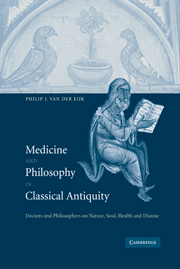 Medicine and Philosophy in Classical Antiquity
Medicine and Philosophy in Classical Antiquity Book contents
- Frontmatter
- Contents
- Acknowledgements
- Note on translations
- Note on abbreviations
- Introduction
- I HIPPOCRATIC CORPUS AND DIOCLES OF CARYSTUS
- 1 The ‘theology’ of the Hippocratic treatise On the Sacred Disease
- 2 Diocles and the Hippocratic writings on the method of dietetics and the limits of causal explanation
- 3 To help, or to do no harm. Principles and practices of therapeutics in the Hippocratic Corpus and in the work of Diocles of Carystus
- 4 The heart, the brain, the blood and the pneuma: Hippocrates, Diocles and Aristotle on the location of cognitive processes
- II ARISTOTLE AND HIS SCHOOL
- III LATE ANTIQUITY
- Bibliography
- Index of passages cited
- General index
3 - To help, or to do no harm. Principles and practices of therapeutics in the Hippocratic Corpus and in the work of Diocles of Carystus
Published online by Cambridge University Press: 22 September 2009
- Frontmatter
- Contents
- Acknowledgements
- Note on translations
- Note on abbreviations
- Introduction
- I HIPPOCRATIC CORPUS AND DIOCLES OF CARYSTUS
- 1 The ‘theology’ of the Hippocratic treatise On the Sacred Disease
- 2 Diocles and the Hippocratic writings on the method of dietetics and the limits of causal explanation
- 3 To help, or to do no harm. Principles and practices of therapeutics in the Hippocratic Corpus and in the work of Diocles of Carystus
- 4 The heart, the brain, the blood and the pneuma: Hippocrates, Diocles and Aristotle on the location of cognitive processes
- II ARISTOTLE AND HIS SCHOOL
- III LATE ANTIQUITY
- Bibliography
- Index of passages cited
- General index
Summary
INTRODUCTION
In a well-known passage from the Hippocratic Epidemics, the doctor's duties are succinctly characterised as follows:
[The doctor should] declare what has happened before, understand what is present, and foretell what will happen in the future. This is what he should practise. As to diseases, he should strive to achieve two things: to help, or to do no harm. The (medical) art consists of three components: the disease, the patient, and the doctor. The doctor is servant of the art. The patient should combat the disease in co-operation with the doctor.
The principle that the doctor is there to help, to refrain from anything that may be harmful, and to use his skill and knowledge and all the relevant information about the disease and the patient in order to assist the patient in his battle against the disease is an idea that frequently recurs in Greek medicine. It is succinctly summarised here in the words ‘to help, or to do no harm’ (ὠφελεĩν ἢ μἠ βλάπτειν), a formula which is often quoted or echoed both in the Hippocratic Corpus and in later Greek and Roman medical literature.
This formula is interesting in that it reflects an early awareness of the possibility that medical treatment can also cause harm. The Hippocratic Oath, which explicitly mentions the well-being of the patient as the doctor's guiding principle, understands this ‘causing harm’ in the sense of deliberately terminating a person's life or otherwise purposively causing disadvantage to his or her situation.
- Type
- Chapter
- Information
- Medicine and Philosophy in Classical AntiquityDoctors and Philosophers on Nature, Soul, Health and Disease, pp. 101 - 118Publisher: Cambridge University PressPrint publication year: 2005
- 2
- Cited by


